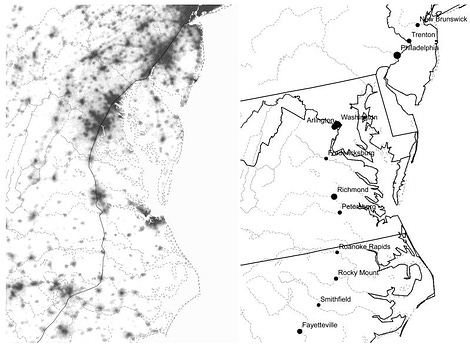Venkatesh Rao's most recent installment of his RibbonFarm Breaking Smart series has comments on the seminal ideas of James Scott, a writer who recently died. I want to pass on clips from his piece that exactly mirrors my sentiments, expressed much more clearly that I could:
James Scott is the reason I’m 40% anarchist. I’m also 40% statist, thanks to Francis Fukuyama, 40% mutualist thanks to Hannah Arendt, and 40% individualist thanks to Douglas Adams. I am large. I contain multitudes.
The great contribution of James Scott to our times was to characterize actually existing anarchism as not just a real thing, but as the most effective and morally defensible political stance in existence. And the functional core of how civilization actually works. Anarchy is neither the macho state of chaotic Hobbesian violence its naive critics assume it must be, nor the anodyne Le Guin pacifism that its apologists pretend it could be if practiced soulfully enough with enough women at the helm. Actually existing anarchism is, as Scott put it in the title of his third major book, simply the art of not being governed.
It means rendering the powers-that-be as inconsequential as possible in one’s personal life, defined and scoped modestly, and defended cunningly, but never quite perfectly.
As an homage to Scott, and for your consideration, I’d like to pose a deeply consequential question that he obliquely gets at in his works, but did not truly get around to exploring:
What is the function of the state?
...by state here, I mean both the public sector and the private sector it organizes and enables through its economic institutions and military/police protections...I'd like to propose an answer:
The function of a state is to pretend to govern more than it actually does.
Contra Scott, and in sympathy with Francis Fukuyama, I do believe in states. I do believe they should exist, and attempt to govern. And that they do in fact manage to govern successfully up to a point. But contra Fukuyama, and in line with Scott, I stop believing in state capacity at precisely the point Scott recommends — where they get tempted into authoritarian high-modernist “schemes to improve the human condition.”...
My idea of a good-enough society — 40% anarchic, 40% statist, 40% mutualist, and 40% individualist, with a strong immune system against utopianisms — rests on a balance of power resulting in what we might call the Scott Social Compact:
The state must pretend to govern more than it does, and individuals must pretend to be governed more than they are.
This pretense is necessary and good because a significant proportion of the population cannot tolerate the thought that the world is in fact far more ungoverned and ungovernable than they would like for their sanity; that there is no benevolent force — not the State, not the Market, not God, not Straussian Great Men, not Enlightened Bureaucracies — that renders existence necessarily blessed, meaningful, and purposeful.
These are the people — I’d estimate they constitute about 30-40% of the population, divided about evenly between the two ends of the political horseshoe — for whom muddling through, slouching towards utopia, with some half-assed mixed of inadequate state capacity and somewhat dysfunctional markets and institutions, is not enough...
They require a clear plan to get to a clearly defined vision of utopia, and the fullest possible expression of state capacity compatible with that vision. They require a glorious vision to surrender to, which a whole host of ideologues are more than willing to cater to, with every configuration of mechanisms imaginable. This essentially religious tendency cannot be eliminated (and it would be immoral to try) but can be managed.
It is important to the collective psyche to let these people...believe that the world is more governed than it is, and that they have a decisive say in how it is being governed...
But it is equally important to not let them actually try too hard or too successfully. ..his is a dynamic that I have grown to appreciate in the last decade. I no longer delight in ripping off various theatrical veils that obscure the workings of modern societies and enjoying the aghast responses from the clueless such ripping can provoke.
It increasingly strikes me as not just an unkind thing to do, but a misguided thing. Even when practiced at the very minor scale at which I have in the past.
There are enough people around with a genuine religious instincts (whether those instincts lead them to AGIs, Efficient Markets, or older divinities) that denying that instinct adequate expression is a surefire way to destroy the world. It is what they call the “meaning crisis.” A too-naked Scottian anarchy in the external world equals nihilism in the inner world for too many. Sufficiently plausible fictions of governance must be allowed to persist while everybody works their way to becoming as enlightened as you and I...Delusions of agency and the mythic consequentiality of one’s own life must be indulged enough that life for the median religious type feels meaningful enough to live. But not so much that they become threats to others.
One part of achieving this condition is that the other 70% — the Great Middle of the distribution that does not require mythic significance and meaning piped into their lives by authoritarian high modernist schemes — must learn and practice the art of not being governed. Including the art of pretending to be governed. Scott’s work highlights the extent to which this natural aptitude has been lost in modernity...
But the other part of achieving this condition is that art of governance must be practiced with sufficient theatricality that more governance appears to be happening than is actually possible under conditions of technological modernity. The theater requires no Machiavellian Straussian Noble Lying to produce. Simply not challenging the narratives people make up to live by, and project onto visible governance processes, does the trick.
There is no esoteric enlightened force of governance wrought by Great Men at work behind the curtain, and there can be none. There is no Deep State either, being steered by shadowy bureaucrats staffing Adjustment Bureaus. There are certainly those who believe they are part of such entities. Their delusions of grandeur too must be humored by the ungoverned — up to a point.
Ultimately, there is only the emergent force of billions of sufficiently ungoverned people — including hundreds of millions who are part of “states” that are supposedly doing the governing — muddling through, making it all hang together just well enough to work.




